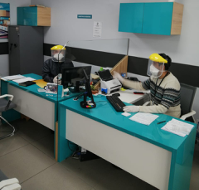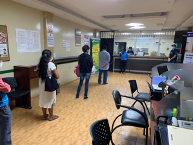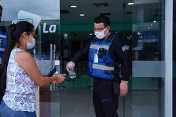Credit Unions in Ecuador Activate the Financial Sector During the COVID-19 Crisis
2020-04-22The coronavirus pandemic has put the financial sector in Ecuador to the test, as it is one of the few services that has not stopped operating even for an instant during the COVID-19 crisis.
Faced with this scenario, Coonecta has been a fundamental pillar for channeling the payment of different economic aids the government allocates to the most vulnerable segments of the population, specifically the Family Protection Bond. The Bond was established to assist more than 500,000 families with independently employed adults get through the crisis. The vast majority of those adult family members work in construction, agriculture, animal husbandry, street food sales and neighborhood stores, among other activities. Money from the Bond has been disbursed since April 1.
Despite the effects of the health emergency in the country, credit unions affiliated with the Coonecta Network have not closed their offices. On the contrary, they continue to operate at different times of the day. Currently, the Network has 350 authorized points of service for the disbursement of the Family Protection Bond, located in more than 118 cantons (extended municipalities) nationwide.
Many of these points of service are located in suburban and rural areas of the country that are not currently served by other financial institutions. That is why the Coonect Network's coverage makes a big difference when compared to other payment networks. In many cases, Coonecta's service points are the only places where beneficiaries can carry out their transactions and withdraw their bonds.
Although the Bond is currently only being disbursed through financial entities and other physical points of service, Coonecta has proposed to the Ministry of Economic and Social Inclusion (MIES)—the state agency responsible for managing these benefits—that other payment methods like the BICOO mobile wallet and direct transfers to beneficiaries' savings accounts be used as well. Channeling these direct subsidies through the financial system by utilizing electronic means of payment represents an effective mechanism for achieving financial inclusion in the country.
The objective for these services is to provide citizens with an alternative to physically approaching a financial institution, thereby avoid unnecessary crowds of people at authorized payment points and protecting the health of employees and members. These mechanisms are also a way for the government to manage the liquidity of the economy, and avoid the need for physical money and the advantages which that implies.
Since the first day of the Ecuador's quarantine and throughout the health emergency, Coonecta has not stopped its activities, demonstrating its strength and capacity for action by maintaining the proper functioning of its network of ATMs, DeUna debit cards, the BICOO mobile wallet and Points Coonecta.
Payments and collections can be made through the compensation system together with other services that are operating without interruptions and guaranteeing access to the members of the 70 financial institutions that make up the Coonecta Network. The primary goal is to minimize the effects of the pandemic and alleviate the despair of the thousands of Ecuadorians who have been and are being affected.
Formed a decade ago with support from a World Council project funded by USAID, Coonecta is the foundational organization for extending digital financial inclusion to the remaining 49% of unbanked people in Ecuador.



